The Things They Carried · Four fears · New York Winter · A Life's Story · Northern California Autumn · My lady ·
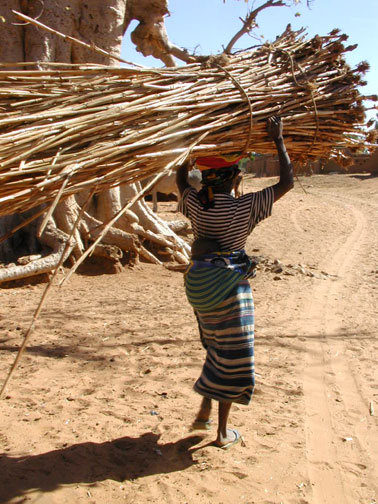
At the tiny port in Gao, Mali, where the Niger river comes right up to the back of the market stalls, the bigger boats are still some ways off. Men in long boubous load onto their heads huge grain bags as tall as and thicker than a man, and slowly walk into the water, waist deep, loading them onto the boats. Boys trudge into the same river downstream in Mopti, for the boats ferrying sand to the city. Stretching out a piece of fabric holding two corners each, two boys per team carry the sand to shore in countless trips. On the shore the sand is sifted shovel by shovel, made into bricks dried by the sub-Saharan sun. In Djenné, where the streets are narrow and overflowing with mud, these bricks are then carried two per head to where they need to go. Whenever I travel to a developing country, I'm awed by the volumes of the world moved by head, limb, and torso. The women of Africa, of course, are famous the world over for what they can carry and how they carry it off, physical definitions of grace under pressure. Bundles of sticks for stoking a fire, halves of calabash, or tubs of enamel with towering piles of produce or laundry barely moves, while she climbs up steep escarpments with not a glance downward, pulls up one side of her billowy boubou to cover a glistening shoulder, and chats with her sisters. There's almost always a babe at the small of her back, two little feet sticking to each side of her waist, content to be swayed everywhere.
In the developed world such physicality, a kinetic sympathy of the weight of the world, is removed from daily life. Container ships, cranes, semis, cars, forklifts, and astronomical volumes are moved on paper and through fiber-optic cables (containers frequently slide off into the sea and it means nothing, I'm told). I suspect that in the world as a whole, flesh and bone move amounts many, many times over than that of steel and conveyer belts. Compared to the weight a grown man or woman often bears in Africa, or the percentage of his weight a child carries, my 30-kilo backpack is really nothing. Yet everything carried this way halfway around the world involves great calculation and weighing in my head. Especially the "non-essential" things: a few silk handkerchiefs and bracelets, tokens of appreciation for women I encounter and won't share a language with; one book, for which I chose Barbara Kingsolver's Poisonwood Bible, as thick as its namesake and an astonishing treatise on the surface and depth of daily life in an African jungle; one picture: that of me on my graduation day from University of California with Peter, who taught me ECON 1A and 1B, Principles of Macro and Microeconomics at the community college a few years earlier. Peter taught that economics is about human motivations, taught me to see past the language of charts and graphs of our mind-bogglingly complex systems to the human stories and urges underneath. Thus an idealist like me can live in this world, remaining in touch.
If people often seem happier in the developing world, it's perhaps because they understand better what they value, and the value of the things around them. When everything must be carried on heads and backs, one is more certain of its use, how it fits in to the greater scheme of things. That includes rice and couscous, hand-fashioned tools, as well as second-hand tape players, brightly colored plastic buckets. Their use is as evident as their weight, in an environment where nothing is superfluous.
Traveling affirms this: in slow journeys, a westerner can temporarily move past the expectations of efficiency, utility, and return on investment, beyond the classifications of capitalism or socialism; Christian, Muslim, or animist; local, indigenous, or foreigner; and see the sunlight and sand and the well and buckets, the men, women, and children doing work and living life: the environment and the human beings forever making peace with it. Poverty underlines this connection as development means complexity means abstraction, while in much of the world it's shoulders to field, hand to mouth, literally. Poverty is not to be romanticized, not pitied nor worshipped; it's just reality, and we look to understand it, to work within it. No matter how we value our educated thought processes, we can only hold so many levels of abstraction in our head without losing them, forgetting the original connections. Thus it's always the details that communicate and serve for memory, not the speech of politicians, economists, business and religious powers-that-be with the lofty and abstract ideals. In America we collectively suffer from a distance from the real, amnesia of the past real, protection from the future real, no burdens to bear leading to an unbearable lightness. We need doses of reality, of nature's poverty and richness, of work done that brings a very tangible reward, of one person's place in a community and in the environment... a sustenance as important as food.
The weight of a thing makes it real. The distance it was carried connects it to everything else. The weight of what I carry also makes me real, and connects me to everything else. In Mopti a young girl, couldn't have been more than 13, took a liking to me and when I shook her hand I was surprised that it felt like a grown man's, thick and callused. By the riverbank of Mopti, I buy tiny bags of peanuts from an old woman and her granddaughter each day, just to exchange smiles with them. The grandma would lay out all the change coins on her palm, so that I could count the unfamiliar currency. I always marveled at her gentleness and her fragile, age-spotted hand as I remove the coins one by one, leaving a few as a kind gesture. I should have left more for her each time. When I touch someone's hand, I become aware of the weight she's accustomed to carry. I do not hold each hand lightly, for I will be carrying the weight of their existence with me too.
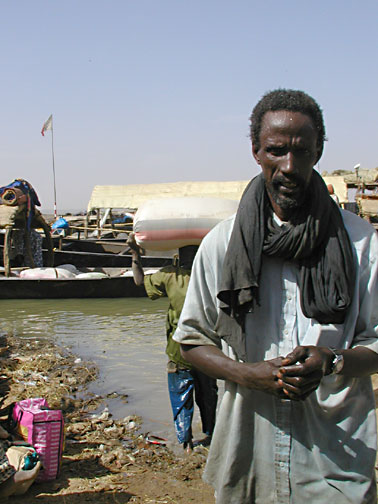
Now, nearing 30, I have a sense of what that thing consists of.
In the late afternoon, sunlight fast diminishing, I finally take a walk to Prospect Park. Tomorrow morning I have an interview, rescheduled, which if I do well in it would allow me to turn my recent world-traveling into a more sustainable lifestyle. But if I don't, if the interviewer doesn't show up again... That was fear no. 1. In the afternoon while in front of the web, that time-sucking machine, I looked at my old company's website for the first time in ten months, and a job description held my attention, in the sense that I couldn't look away, except to step out of the house. If I have to go back to the last three years, live them again, over and over, becoming stagnant between the job and the commute... Especially when that's what's expected of me. Fear no. 2. I emailed a friend to ask him to call. Haven't talked to old friends in so long, email exchanges dwindle. J doesn't even check email anymore, so I don't know if anything significant happened in his life. Or insignificant. There are fewer and fewer reasons to go back to the Bay Area. No one, anywhere, is waiting for me to return, to come home. Fear no. 3. Dad and I are finally communicating now, but he doesn't ask me questions or answer mine. He will meet a friend of mine visiting China, only briefly, but at least I will know from my friend how my father is, see pictures. I'm picturing his hair, is it all white now? He is not getting younger. The time that I have left to get to know him is dwindling. Fear no. 4.
I'm not coming to the conclusion that childhood and adulthood are similar, just populated by different fears. It is freezing cold as I walk and in less than an hour I'm shivering, yet I make the long way through the park, quiet at this hour. Half the sky is lit red-orange by the sun now under the horizon--a light effect called bounce. No one tells me to pull on another layer or to come home earlier, and I'm glad of this. No, there's no going back. Displacing the nightmares of childhood, the stuff that preoccupies us now is the very thing that propelled us toward adulthood. What would I do without them?
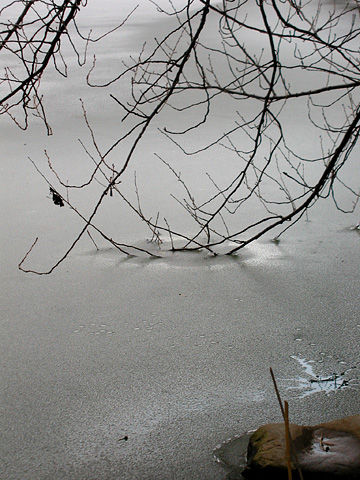
New York Winter
They may say if winter's here, spring couldn't be far behind, but in New York that's not true. Winter is still long coming even if you think you're in the worst of it. The cocooned people huddle in stores they have no need for just to be indoor, and end up carrying out shopping bags. Even hardy, un-sheltered people like these two, who normally loved the elements for their aesthetics and the sharper focus coldness induced, do not venture outside often. But they are on a late afternoon walk through a large city park, the first venturing out of the tiny apartment this day. The park is beautiful in its desolate way, brown branches against light gray snow, water frozen over, no movement save for the flinching of a few brown fuzzy tails. They talk quietly, deliberating over their words to both communicate and infuse a poetic sense into each response. It's the kind of talk that attracted them to each other in the first place, in which they can feel deep and precise and understood, the very opposite of chit-chat. But there's one less layer to the conversation now, because the question of who they are to each other is clear.
The sense of the tragic is there, they both knew it. Being who they are, both are no stranger to this feeling. Being familiar with it, both are more comfortable with this than with uncertainty, and now they can shape the experience to suit their own narratives. They talk engagedly, make characters out of passers-by, he teachs her haikus, they are having fun. Fun is fun. But sadness is also sadness. An idea of themselves as diamond-sharp intruments has often formed in her head as they talked, which is exciting to her, and he speaks of being split open. But emotional callouses proved harder than diamonds.
The late afternoon light fades quicker than one expects. The wind is cutting her cheeks now, and they make an early turn to head back. He continues to make haikus, 3 lines of 5-7-5 syllables. She has a difficult time deciphering syllables, and constantly asks him to count individual words for her. As they turn on his street, a quiet row of brownstones, she half surprises him:
Indelible marks.
Hearts broken, mended, nurtured,
a long walk in snow.
He turns, smiles from behind his glasses. She smiles back, and they duck indoors.
More images from the Brooklyn Botanical Garden
Monologue on a Savannah bus
"Man it sucks to be homeless when it's cold, man!
"Those homeless shelters get too full and they don't let you in and you have to stay out in the cold, man!
Savannah offers a free tourist shuttle. It's a good thing and as many locals as tourists use it. (Though eventually I saw that locals use it partly because the rest of the public transportation is lacking, not only because the shuttle's free.) Almost always, the locals on the shuttle are black, and the tourists are white. This afternoon the shuttle was fairly full. I heard two men greet each other, started to chat, then one man's voice grew louder and louder, and his voice and what he was saying shortly silenced the entire bus, so that we all listened to the monologue:
"You don't know how many times I've been staying out in the cold, man!
"I've stayed in so many abandoned buildings, God it's cold!
"I've heard there are people who die from the cold, from the, frostbite, man!
"I'm glad I'm spared that, man!
"One time, I was staying in my grandma's, garage, man I think it was, it was 30, degrees, I was so cold! Not through the night I had to knock on the door, and say let me inside! Man!
"My grandma, she doesn't care one bit, man! But I still go see her when I want to see her, man!
"One time, she kicked me out, and I made it all the way to California! Man!
"She kicked me out, but she didn't know I'd go all the way to California! Ha ha ha!
"My brother, he called her and told her I was in California!
"She was so worried, she didn't know where I was, for, a whole week!
"I could have bought a house in California! Man!
"Houses are cheap in California!
At this point some tourists laughed a little. I could not see the man from where I was sitting.
"Three bedroom house, you could buy for $28,000! Here it's $56,000! Man!
"There are some that are $130,000, even! Man!
"I could have bought a house in California!
"But hmm, I came back to Savannah, because, I heard this news report...
"They are going to invest in the Southeast of the US, man!
"They are going to invest in these parts!
"They are not going to invest in California!
"See ya, man!"
I realized it's my stop too and quickly head for the door. I see only his back, outfitted in a long jacket and baggy pants of some shiny white material, both decorated all over with small American flags and silvery paint. The size and texture of the suit and the American flags made me think of a spacesuit, and as we step off the bus into the mottled afternoon sunlight, I half expected him to proclaim he's landed on the moon, and God bless America.
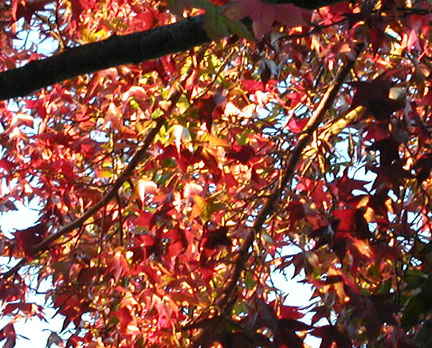
Northern California Autumn
Stepping outside, they start on a meandering walk through the foothills. He swings his arm around her a few blocks later, letting it hang there. Though they've been lovers for sometime and loving toward each other, a shyness, a little physical reticence, persists between them. The maples have turned color. Pushing down her sunglasses, she stares against the sun at the confetti of colors from red at the top to green at the bottom and golden yellow twinkling between. It is fall… the most glorious time in Northern California as the sun is clear and hot and the colors shine true and all is wonderful because, well, there is no threat of Winter. "Ah… Northern California Autumn," the billboard for a department store says. Know you’re lucky, even privledged, and bask in it. They walk under one of the maples, with her head pivoting to look at it still. But she can’t seem to see it to her content… they seemed brighter in her memories, or she had hoped them to be brighter. But how could you ask more of these trees? How could you ask for anything more?
When you can’t see things for what they are, it is time for some distance. She wishes for the cold now, for anything other than the drowsy warmth, for cold that is biting and exacting and every follicle on her skin would be wide awake. The thought made her shiver, ever slightly, but he noticed and squeezed his hand on her shoulder. The warmth of it filled her with gratitude. Before the leaves are all swept up she will be gone.
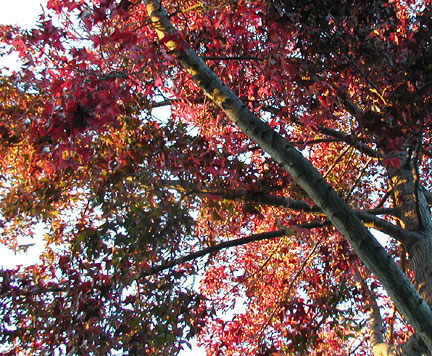
In the morning I walk with my host lady to the car, which is parked on the backstreet, to go to the grocery store. "We have to walk across the neighbor's garden," she said, and we do, over the perfectly manicured Swiss lawn. At the gate she tests the latch and says "oh no, you see sometimes they lock it," and proceed to swing her leg over the fense, then jump down on the otherside. I smile to myself then follow her, more clumsily, then ask why her own gate, some 10 yards away, couldn't be used. "It's rusted shut, you see, well I could use it, but sometimes it's just easier to use the neighbor's, and they don't complain." Later at dinner, we admire the view of the hills from her bay window. Commenting on a tree in the garden that for me was part of the landscape, my host tells me it belongs to the neighbor, and she occasionally cuts down branches at night because she doesn't want it to block the view. "I love to cut down trees at night," she laughs, "big branches, but you could never tell they have been cut." I think of a 62-year-old woman amputating trees in the night and disposing bodies of evidence, all in the communal backyard, and I say, "but, but couldn't they hear you?" "No, they're old, you see," she pauses, "and I buy this green sticky stuff that you can use to cover up..." I'm staring at her now, and as she went on to say she thinks its better for the tree as it's a kind of pruning that's ultimately good for it and for the neighbors, I ask, "wouldn't the neighbors like that you're doing this, if you just asked them?" "No, you see, some people you just couldn't talk reason to them..." I look at this woman with her lightening-struck frizzy hair in amazement, and understood why the neighbors haven't been greeting us. Yet I'm enjoying her company and her friendship all the more.